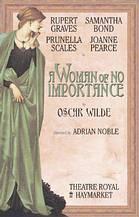A Woman of No Importance
Adrian Noble has decided to revive Oscar Wilde's "A Women of No Importance" for no apparent good reason, or none that shows itself in this production. Wilde has written some delightful plays, but even a genius can blunder from time to time, and there remains little doubt for me that with this play Wilde blundered big time. What a pity that producers try to revive this nonsense.
The story concerns Lord Illingworth, who years ago seduced a young woman, persuading her to elope with him after promising marriage and respectability only to refuse to be true to his word even though the woman was pregnant and the child she was carrying would be illegitimate and so a social outcast. The woman, furious at Lord Illingworth, left him taking her newborn son with her.
Now, 20 years later Lord Illingworth meets a charming young man named Gerald Arbuthnot at a country house party and offers him a job as his secretary. Later that same evening Lord Illingworth offends a young American woman who Gerald believes he has fallen in love with and just as Gerald is about to strike Lord Illingworth, Gerald's 'widowed' mother intervenes shouting "Stop, Gerald, stop! He is your father". This is just one of many melodramatic moments and there are many other equally outlandish lines, such as when Mrs Arbuthnot says to Gerald, "You are more to me than innocence. I would rather be your mother - oh! much rather! - than have been always pure" or again "Child of my shame, be still the child of my shame!"
There are a number of reasons why this attempt by Wilde to write a play with a social conscience fails. The first two acts of the play are full of Wilde's famous witticisms, such as "All women become like their mothers. That is their tragedy. No man does, that is his." Speaking of married men Wilde writes, "They are horribly tedious when they are good husbands, and abominably conceited when they are not." And again, "I delight in men over seventy, they always offer one the devotion of a lifetime." Whilst these two acts allow Wilde to show off his skill as a satirist they have very little to do with the story that follows.
There is also far too much hand wringing on behalf of the cheerless Mrs Arbuthnot who seems more than willing to accept her fate as a fallen woman. In fact there almost seems something masochistic about her need to be punished. Wilde also seems unwilling to upset the upper-class socialites with which he often dined. In the play the upper class are painted as a decent jolly lot, who are absolute hoots always able to amuse with a witty quip and are the very picture of elegance and charm! He seems to have forgotten that we are meant to dislike these people whose social values are the cause of Mrs Arbuthnot's misery.
If one can see pass the melodramatics and the layered structured of Wildes script, the production does have a few highs. There are some wonderful characterisations - Prunella Scales as the innocuous, scatty Lady Hunstanton, Caroline Blakiston as the prickly Lady Caroline, Peter Cellier as the saintly Archdeacon Daubeny who appears to be married to a woman who has long since fallen into state of total ill-health! Rupert Graves is a charming caddish Lord Illingworth and a joy to watch.
Samantha Bond gives a brave performance as Mrs Arbuthnot given the histrionics demanded of the character by the script. She is able to deliver her lines with startling precision that allows you to see beyond the gaudy language to the anguish that it is suppose to express. This was in startling contrast to Julian Ovenden who plays Gerald Arbuthnot, the script overwhelms him and his performance at times seems feigned.
As valiant as the acting is this remains a play of no importance.
What other critics had to say.....
SARAH HEMMING for THE FINANCIAL TIMES says, "A curiously lifeless affair." DOMONIC CAVENDISH for THE DAILY TELEGRAPH says, "High-class production is, quite simply, a must-see." BENEDICT NIGHTINGALE for THE TIMES says, "A lifeless lesson in pretty wit." MICHAEL BILLINGTON for THE GUARDIAN says, "Adrian Noble's handsome-looking production does all it can to counter the play's contradictions." NICHOLAS DE JONGH for THE EVENING STANDARD says, "Limp production of this creaky melodrama."
External links to full reviews from popular press
Financial Times
Daily Telegraph
The Times
The Guardian
A Woman of No Importance tickets are now on sale.
Originally published on
